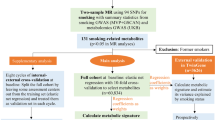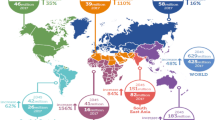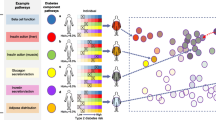Abstract
To assess the association between type 2 diabetes and rs10811661 polymorphism, upstream of CDKN2A/B, a literature-based search was conducted to collect data. The pooled OR (odds ratio) and 95 % confidence intervals (CI) were used to assess the strength of association between rs10811661 polymorphism and type 2 diabetes. OR with 95 % CI were performed for allele contrasts, additive genetic model, dominant genetic model and recessive genetic model, respectively. The effect model was used if there was heterogeneity between studies. Funnel plots were used to predict publication bias. 17 studies with 29,990 cases and 40,977 controls were enrolled in this meta-analysis. Significant association was found in all of the four genetic models: allele contrast (OR = 1.21, 95 % CI 1.18–1.24), additive genetic model (OR = 1.51, 95 % CI 1.40–1.63), dominant genetic model (OR = 1.37, 95 % CI 1.28–1.47) and recessive genetic model (OR = 1.25, 95 % CI 1.21–1.29). The meta-analysis indicated that rs10811661 polymorphism was significantly associated with the risk of type 2 diabetes.



Similar content being viewed by others
References
Khamaisi M, Raz I (2002) Diabetes epidemic and thrifty genes. Isr Med Assoc J 4(9):720–721
Shaw JE, Sicree RA, Zimmet PZ (2010) Global estimates of the prevalence of diabetes for 2010 and 2030. Diabetes Res Clin Pract 87(1):4–14
Wild S, Roglic G, Green A, Sicree R, King H (2004) Global prevalence of diabetes: estimates for the year 2000 and projections for 2030. Diabetes Care 27(5):1047–1053
Voight BF, Scott LJ, Steinthorsdottir V et al (2010) Twelve type 2 diabetes susceptibility loci identified through large-scale association analysis. Nat Genet 42(7):579–589
Trevers ME, McCarthy MI (2011) Type 2 diabetes and obesity: genomics and the clinic. Hum Genet 130(1):41–58
Hribal ML, Presta I, Procopio T et al (2011) Glucose tolerance, insulin sensitivity and insulin release in European non-diabetic carriers of a polymorphism upstream of CDKN2A and CDKN2B. Diabetologia 54:795–802
Rane SG, Dubus P, Mettus RV et al (1999) Loss of Cdk4 expression causes insulin-deficient diabetes and Cdk4 activation results in beta-islet cell hyperplasia. Nat Genet 22(1):44–52
Moritani M, Yamasaki S, Kagami M et al (2005) Hypoplasia of endocrine and exocrine pancreas in homozygous transgenic TGF-beta-1. Mol Cell Endocrinol 229(1–2):175–184
Higgins JP, Thompson SG, Deeks JJ, Altman DG (2003) Measuring inconsistency in meta-analysis. BMJ 327(7414):557–560
Kim WY, Sharpless NE (2006) The regulation of INK4/ARF in cancer and aging. Cell 127(2):265–275
Cauchi S, Meyre D, Durand E et al (2008) Post genome-wide association studies of novel genes associated with type 2 diabetes show gene–gene interaction and high predictive value. PLoS One 3(5):e2031
Cauchi S, Proena C, Choquet H et al (2008) Analysis of novel risk loci for type 2 diabetes in a general French population: the D.E.S.I.R. study. J Mol Med 86(3):341–348
Duesing K, Fatemifar G, Charpentier G et al (2008) Strong association of common variants in the CDKN2A/CDKN2B region with type 2 diabetes in French Europids. Diabetologia 51(5):821–826
Grarup N, Rose CS, Andersson EA et al (2007) Studies of association of variants near the HHEX, CDKN2A/B, and IGF2BP2 genes with type 2 diabetes and impaired insulin release in 10,705 Danish subjects: validation and extension of genome-wide association studies. Diabetes 56(12):3105–3111
Groenewoud MJ, Dekker JM, Fritsche A et al (2008) Variants of CDKAL1 and IGF2BP2 affect first-phase insulin secretion during hyperglycaemic clamps. Diabetologia 51(9):1659–1663
Han X, Luo Y, Ren Q et al (2010) Implication variants near SLC30A8, HHEX, CDKAL1, CDKN2A/B, IGF2BP2, FTO, TCF2, KCNQ1, and WFS1 in type 2 diabetes in a Chinese population. BMC Med Genet 11:81
Horikoshi M, Hara K, Ito C et al (2007) Variations in the HHEX gene are associated with increased risk of type 2 diabetes in the Japanese population. Diabetologia 50(12):2461–2466
Kirchhoff K, Machicao F, Haupt A et al (2008) Polymorphisms in the TCF7L2, CDKAL1 and SLC30A8 genes are associated with impaired proinsulin conversion. Diabetologia 51(4):597–601
Lauenborg J, Grarup N, Damm P et al (2009) Common type 2 diabetes risk gene variants associate with gestational diabetes? J Clin Endocrinol Metab 94(1):145–150
Omori S, Tanaka Y, Takahashi A et al (2008) Association of CDKAL1, IGF2BP2, CDKN2A/B, HHEX, SLC30A8, and KCNJ11 with susceptibility to type 2 diabetes in a Japanese population. Diabetes 57(3):791–795
Sanghera DK, Ortega L, Han S et al (2008) Impact of nine common type 2 diabetes risk polymorphisms in Asian Indian Sikhs: PPARG2 (Pro12Ala), IGF2BP2, TCF7L2 and FTO variants confer a significant risk. BMC Med Genet 9:59
Saxena R, Voight BF, Lyssenko V et al (2007) Genome-wide association analysis identifies loci for type 2 diabetes and triglyceride levels. Science 316(5829):1331–1336
Scott LJ, Mohlke KL, Bonnycastle LL et al (2007) A genome-wide association study of type 2 diabetes in Finns detects multiple susceptibility variants. Science 316(5829):1341–1345
Tabara Y, Osawa H, Kawamoto R et al (2009) Replication study of candidate genes associated with type 2 diabetes based on genome-wide screening. Diabetes 58(2):493–498
Wen J, Ronn T, Olsson A et al (2010) Investigation of type 2 diabetes risk alleles support CDKN2A/B, CDKAL1, and TCF7L2 as susceptibility genes in a Han Chinese cohort. PLoS One 5(2):e9153
Yukio H, Kazuaki M, Kazuki Y et al (2008) Replication of genome-wide association studies of type 2 diabetes susceptibility in Japan. Clin Endocrinol Metab 93(8):3136–3141
Zeggini E, Weedon MN, Lindgren CM et al (2007) Replication of genome-wide association signals in UK samples reveals risk loci for type 2 diabetes. Science 316(5829):1336–1341
Parra EJ, Below JE, Krithika S et al (2011) Genome-wide association study of type 2 diabetes in a sample from Mexico City and a meta-analysis of a Mexican-American sample from Starr County, Texas. Diabetologia 54(8):2038–2046
Chidambaram M, Radha V, Mohan V (2010) Replication of recently described type 2 diabetes gene variants in a South Indian population. Metabolism 59(12):1760–1766
Author information
Authors and Affiliations
Corresponding author
Additional information
Communicated by Guido Pozza.
Rights and permissions
About this article
Cite this article
Li, H., Tang, X., Liu, Q. et al. Association between type 2 diabetes and rs10811661 polymorphism upstream of CDKN2A/B: a meta-analysis. Acta Diabetol 50, 657–662 (2013). https://doi.org/10.1007/s00592-012-0400-7
Received:
Accepted:
Published:
Issue Date:
DOI: https://doi.org/10.1007/s00592-012-0400-7




